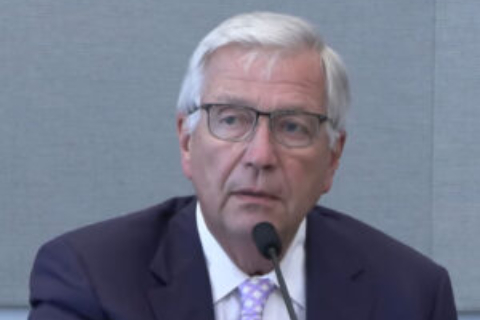By Dar Danielson (Radio Iowa)
The State Board of Regents approved an increase in salary or retention bonuses for the three presidents of the University of Iowa, Iowa State University, and the University of Northern Iowa Wednesday.
Board President Michael Richards read the proposed increase for U-I President Barbara Wilson. “Authorize a $50,000 increase to her annual base salary effective July 1st 2023. Amend the 2021 deferred compensation plan to increase the total principal value by 25 percent,” he says. The raise moves Wilson’s yearly salary to $700,000.
For ISU president Wendy Wintersteen, there will be a new deferred compensation plan starting July 1st with annual contributions of $415,000, and her new employment agreement extends through June 30th of 2026. Her salary stays at $650,000. UNI president Mark Nook also receive a raise. “Authorize a $15,000 increase to his annual base salary effective July 1st 2023,” Richards says. This moves Nook’s salary to $372,110 a year.
The executive director of the Board of Regents, Mark Braun is also getting a change in his deferred compensation. Richard says they will establish a new deferred compensation plan starting July 1st, 2023 and ending on June 30th, 2025, with annual contributions of $155,000 for Braun. The Regents discussed the salary issues in a closed meeting Tuesday and did not make any comments before voting to approve them Wednesday.
After raising the compensation packages for the Board and university leaders, the Regents then approved a 3.5% tuition increase for in-state students. Iowa State University student body vice president, Jennifer Holiday spoke before the vote. “We understand the decision to increase tuition is not one taken lightly or made out of apathy, but rather out of necessity. The deficit between state allocations, and unnecessary costs must be supplemented for the sake of student success,” Holiday says.
Holiday says the increase can also inhibit students as they have to choose between eating and paying for textbooks. “As we prepare for the next meeting of the State General Assembly, Iowa State student government is ready to advocate alongside the Board and our other Regent universities to secure increased allocations from the state,” Holiday says. “Increased tuition and fees may be the short-term fix, but it is not a viable long-term solution for our students attending Iowa State University.”
University of Iowa student body vice president Carly O’Brien also discussed the burden on students. She says 30 percent of undergraduate students report using more than half of their income for housing and struggle with paying for food. “Sixty-seven percent of students in Iowa report eating less because they could not afford food. As a STEM major, I regularly learn about the importance of nutrition for daily functioning, and I’ve seen students struggle with the ultimatum to buy textbooks or food,” O’Brien says.
UNI student body president Micaiah Krutsinger says he encourages the legislature and the Board of Regents to look at how the school is being funded. “If the core inflation is expected to be around four percent in 2023 and three percent in 2024, why is the state’s 2024 appropriations for general funding staying flat, while tuition is proposed to increase three-point-five percent?,” he says.
Krutsinger says state funding for higher education has not kept up. “In fiscal year 2001, 63,7% of the three universities’ general funding came from the state, and 30.6% from tuition,” Krutsinger says. “Now, for fiscal year 2023’s budget is nearly flipped with 30.5% from the state and 63-point-eight percent from tuition. Krutsinger says the three universities combined currently have $57.5 million less in general funding from the state as compared to 2001.
The Board of Regents approved the tuition increase and also an increase in mandatory fees without discussion.




